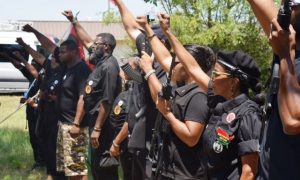Finally some good news!! So many people are serving time for crimes they did not commit and it is unfortunate that the State of Texas is known for not overturning convictions. I am glad this one is blowing up the record books and what’s so awesome is God came through for him when he had “given up” on clearing his name.
Read about it as reported by USA Today:
Michael Phillips had long ago given up trying to clear his name. At 57, he was a registered sex offender, living in a nursing home, wheelchair-bound from severe sickle-cell anemia.
Then in May, two police officers delivered news that Phillips says only God could have ordained: Dallas County, Texas, prosecutors had proved through DNA testing that he had spent 12 years in prison for a rape he hadn’t committed.
Hundreds of people have been exonerated through DNA testing. But on Friday, Phillips will become the first exonerated by DNA through systematic testing by a prosecutor’s office even though he hadn’t requested the testing, according to the National Registry of Exonerations, a project of the University of Michigan Law School and the Center on Wrongful Convictions at Northwestern University School of Law.
“I’m in awe,” Phillips of Dallas told USA TODAY. “At first, I thought I was like, kind of in another time zone or a twilight zone.”
As the news sank in, he says, the Holy Spirit confirmed to him that it was all part of his life’s plan.
The exoneration comes thanks to the Dallas County District Attorney’s Conviction Integrity Unit, which is testing DNA evidence on decades-old cases even when convicted defendants aren’t proclaiming their innocence.
The project examines rape cases when sperm or seminal fluid was found and the DNA samples are from one assailant.
In 2007, Dallas County District Attorney Craig Watkins created the nation’s first conviction integrity unit, which investigates claims of wrongful conviction and has exonerated 33 people.
That caught the attention of Samuel Gross, editor of the National Registry of Exonerations. In 2007, he urged Watkins’ office to look at rape cases, because the evidence usually includes DNA testing, even if the convict did not claim innocence. The office began that work in 2009.
The project has completed testing in seven cases from 1990, shortly before DNA testing became routine.
Only Phillips has been exonerated.
“This case means not just Dallas County but other DAs (need) to proactively look at issues that they may have in their files,” Watkins says. “There may be an innocent person that is languishing in prison for something they didn’t do. Don’t wait for somebody to knock on your door to tell you … ‘I didn’t do the crime.’ ”
Phillips’ ordeal began in 1990, when a 16-year-old girl was raped at a motel where he worked and lived. The victim, who was white, says she was attacked in her room by a black man wearing a white ski mask. A police report says the woman pulled up her attacker’s mask and “immediately recognized suspect Phillips as a man she had previously seen at the same location.” The woman told officers she fought and bit her attacker.
Phillips says he was home sleeping when the crime happened.
Days later, he was awakened at 7 a.m. by eight police officers with guns drawn.
“I was sleeping, and they snatched me out of bed and told me I was being arrested for rape,” he says. “I couldn’t believe it was happening.”
Phillips denied raping the woman, but she identified him in a photo lineup.
Once Watkins’ office began its project, semen from the 1990 rape kit was put into the FBI’s Combined DNA Index System and identified another man, Lee Marvin Banks, as a the real rapist, Watkins said. Banks lived at the same motel where the rape took place but cannot be prosecuted because the statute of limitations has run out. His criminal record will note that he was a match in the rape, Watkins said.
Phillips feared a jury would take the word of a white woman over a black man. Gross says it’s not unusual for a victim of one race to identify the wrong person if the perpetrator was another race.
Phillips says his public defender told him he could be sentenced to as much as 99 years in prison because he had already done time for aggravated burglary.
“In 1990, it felt like slavery was still going strong for me,” he says. “The deck was stacked against me from Jump Street — like 100-to-1.”
Watkins echoes Phillips. “The bigger picture is black men have been marginalized for years, and I’m tired of that. I take that very personal,” he says. “We can offer things to the world, and yet we have people in power that want to keep us in positions that don’t allow us to present those talents.”
In a plea bargain, Phillips pleaded guilty and was sentenced to 12 years in prison. His lawyer said he’d be out in about four, but he was denied parole and served the full term.
Of the 1,404 U.S. exonerations since 1989, more than 10% involved people who pleaded guilty, according to the registry.
Phillips’ father died while he was in prison. He went for one month confined to his cell 24 hours a day. He was hospitalized nine times because of sickle-cell anemia.
Released in 2002, Phillips was quickly rearrested and did an extra six months in prison for failing to register as a sex offender.
Back then, he filed a court challenge to his conviction but it failed.
Eventually, he went to live with his brother and gave up claiming he was innocent.
“As far as my case was concerned, I just said it was over with,” Phillips says. “All I had to do was finish my time and then go about my business.”
It’s very rare for someone to be exonerated without seeking it, Gross says.
“We should learn that there are people who have been convicted of serious crimes who are not actively seeking exoneration but who are innocent nonetheless,” he says. “We don’t know how many, but there may be many more than we suspect. And if we try, we can find some of them.”
Under Texas law, Phillips will be compensated $80,000 for each of his 12 years in prison plus $80,000 a year for the rest of his life, Watkins’ office says.
“It feels good now that I know that my father God was behind everything,” Phillips says. “Everything he does puts me in awe. It just makes my faith stronger and stronger every day.”
Source: USA Today, (Video) CBS News 11
[AdSense-A]














































































































































































































































![[Video] Chicago Police Officers Caught On Video Telling Two Black Men "We Kill Mother F**kers"](https://earhustle411.com/wp-content/uploads/2018/07/evil-cop-3-300x180.jpg)
![[Video] Chicago Police Officers Caught On Video Telling Two Black Men "We Kill Mother F**kers"](https://earhustle411.com/wp-content/uploads/2018/07/evil-cop-3-80x80.jpg)












![[Video] White Woman Calls The Cops On Black Real Estate Investor, Cops Threaten To Arrest Her For Harassing Him](https://earhustle411.com/wp-content/uploads/2018/05/nosy-neighbor-300x180.png)
![[Video] White Woman Calls The Cops On Black Real Estate Investor, Cops Threaten To Arrest Her For Harassing Him](https://earhustle411.com/wp-content/uploads/2018/05/nosy-neighbor-80x80.png)


![White Scientist Says The Black Community Is Being Targeted By The Medical System, They Are Deliberatly Being Poisoned [Video]](https://earhustle411.com/wp-content/uploads/2016/05/mike-adams-300x180.jpg)
![White Scientist Says The Black Community Is Being Targeted By The Medical System, They Are Deliberatly Being Poisoned [Video]](https://earhustle411.com/wp-content/uploads/2016/05/mike-adams-80x80.jpg)








![Teenage Girl Shot In Her Stomach Three Times But Took Time To Post To Facebook [ Video]](https://earhustle411.com/wp-content/uploads/2016/02/Gangster-chick-300x180.jpg)
![Teenage Girl Shot In Her Stomach Three Times But Took Time To Post To Facebook [ Video]](https://earhustle411.com/wp-content/uploads/2016/02/Gangster-chick-80x80.jpg)







